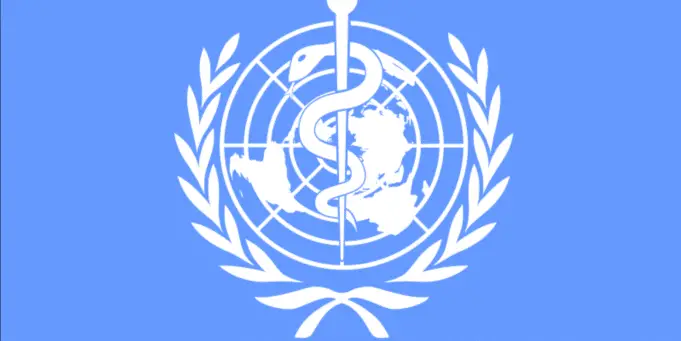World Health Organization (WHO), also known as Organisation Mondiale de la Santé in french, is a specialized agency of the United Nations (UN) responsible for improving public health globally.
The agency was established on the 7th of April 1948, and its administrative headquarters is located in Geneva, Switzerland, with six semi-autonomous regional offices and 150 field offices worldwide.
The agency inherited specific tasks dealing with the control of epidemics, quarantine measures and the standardization of drugs from the Health Organization of the League of Nations which was established in 1923 and the International Office of Public Health set up in 1907.
However, WHO was given a broad mandate in its constitution to further international cooperation on improved health for all citizens – its main objective being “the attainment by all peoples of the highest possible level of health.”
The organization’s mandate also includes monitoring public health risk, universal healthcare, coordinating response health emergencies globally and promoting human health and well being. Furthermore, WHO sets international health standards and guidelines, provides assistance to countries and collects data on global health issues.
At the headquarters in Geneva, Switzerland, governance of the organization operates through the World Health Assembly, which meets annually as the general policy-making body, and through an executive board of health, specialists elected for three-year terms by the assembly.
The WHO Secretariat consists of experts, staff and field workers and is responsible for carrying out routine operations and helps implement strategies. The agency is headed by a director general nominated by the executive board and appointed by the World Health Assembly.
The World Health Assembly is composed of representatives from 194 member states and serves as the agency’s main decision-making body. It is responsible for electing a new director-general as well as setting goals and priorities, and approving the agency’s activities and budget.
The director-general of the WHO is supported by a deputy director and a number of assistant director generals, each specializing in a specific area within the organization’s framework.
The World Health Organization is primarily financed from annual contributions made by member governments and private donors. WHO’s budget was estimated to be over $4.2 billion as of 2018. For member governments, contributions are made based on their relative ability to pay.
Objectives of the World Health Organization
The WHO’s Constitution states that its objective “is the attainment by all people of the highest possible level of health”.
According to the WHO’s constitution, the body’s objectives are to
- To act as the directing and coordinating authority on international health work;
- To establish and maintain effective collaboration with the United Nations, specialized agencies, governmental health administrations, professional groups and such other organizations as may be deemed appropriate;
- To assist Governments, upon request, in strengthening health services;
- To furnish appropriate technical assistance and, in emergencies, necessary aid upon the request or acceptance of Governments;
- To provide or assist in providing, upon the request of the United Nations, health services and facilities to special groups, such as the peoples of trust territories;
- To establish and maintain such administrative and technical services as may be required, including epidemiological and statistical services;
- To stimulate and advance work to eradicate epidemic, endemic and other diseases;
- To promote, in cooperation with other specialized agencies where necessary, the prevention of accidental injuries;
- To promote, in cooperation with other specialized agencies where necessary, the improvement of nutrition, housing, sanitation, recreation, economic or working conditions and other aspects of environmental hygiene;
- To promote cooperation among scientific and professional groups which contribute to the advancement of health;
- To propose conventions, agreements and regulations, and make recommendations with respect to international health matters and to perform.
The WHO, in 2012, defined its role in public health as follows:
- Providing leadership on matters critical to health and engaging in partnerships where joint action is needed;
- Shaping the research agenda and stimulating the generation, translation, and dissemination of valuable knowledge;[31]
- Setting norms and standards and promoting and monitoring their implementation;
- Articulating ethical and evidence-based policy options;
- Providing technical support, catalyzing change, and building sustainable institutional capacity; and
- Monitoring the health situation and assessing health trends.
- CRVS (civil registration and vital statistics) to provide monitoring of vital events (birth, death, wedding, divorce)
Role of WHO in Disease Prevention
WHO sponsors measures for the control of endemic and epidemic diseases by promoting mass campaigns that involve nationwide vaccination programs, education and awareness on the use of antibiotics and insecticides, and the improvement of laboratory and clinical facilities for early diagnosis and prevention of infections.
WHO also provides measures and strategies for assistance in providing pure-water supplies and sanitation systems and health education for people living in rural communities. These campaigns have had some success against malaria, smallpox, AIDS several other diseases.
Smallpox was globally eradicated in May 1980, a feat attributed to the efforts of WHO. Furthermore, the WHO declared the global outbreak of COVID-19 to be a pandemic in March 2020. COVID-19 is a severe respiratory illness caused by a novel coronavirus that first appeared in Wuhan, China, in late 2019.
The agency acted as a global information center on the illness, providing regular situation reports and media briefings on its spread and mortality rates; dispensing technical guidance and practical advice for governments, public health authorities, health care workers, and the public; and issuing updates of ongoing scientific research.
As infections and deaths caused by the virus continued to increase in the United States of America, President Donald Trump accused WHO of conspiring with China to conceal the spread of the virus in China during its early stages.
Following this, the Trump administration formally notified the United Nations that the U.S would withdraw from the agency in July 2021.












